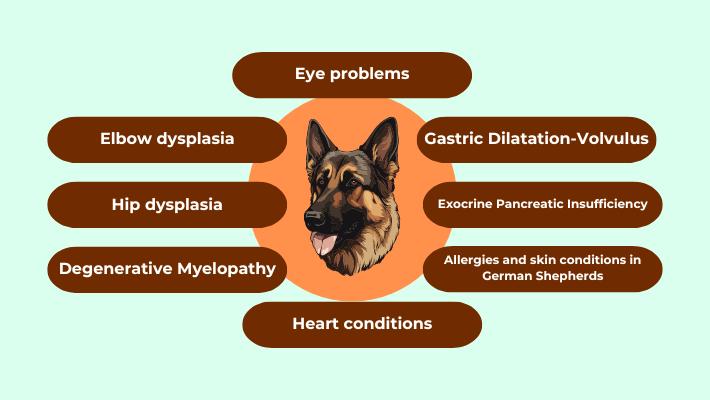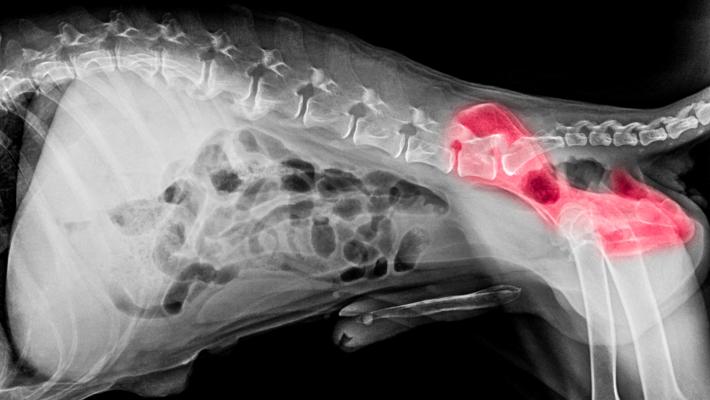A Look At Common German Shepherd Health Issues


When it comes to loyal and intelligent companions, German Shepherds are at the top of the list. These magnificent dogs excel in various roles, from guarding our homes and working alongside law enforcement to providing emotional support. Owing to their excellent work ethic, they have managed to capture the hearts of many dog lovers around the world.
But even large and powerful dogs like German Shepherds fall sick. They are prone to several health issues that can severely affect their quality of life. But learning about these German Shepherd health issues will help you to quickly spot the warning signs, seek medical attention, and provide the best possible care for your German Shepherds. So lets dive in!
Common German Shepherd Health Issues

German Shepherds are generally a robust breed, but they do have a predisposition to certain health conditions. It is essential to be aware of these issues to prevent them or detect them early on. By being proactive and knowledgeable, you can ensure that your German Shepherd lives a happy and healthy life. Here are some common German Shepherd Health issues:
Elbow Dysplasia
It is a collective term for several developmental abnormalities affecting the elbow joint in dogs. In German Shepherds, the most common form is humeral condylar osteochondrosis (HCO).
While the exact cause remains unknown, genetics and rapid growth are believed to play a significant role. During development, the cartilage in the elbow doesn’t form properly, leading to improper bone development and potential detachments. Signs typically appear between 4-10 months of age.
Common symptoms include:
- Limping, favoring one or both front legs.
- Difficulty rising or reluctance to bear weight on the forelimbs.
- Stiffness in the elbows, affecting range of motion.
- Vocalization due to pain, especially when touched around the elbows.
- Diagnosis: Diagnosis involves a veterinarian examining the dog for gait abnormalities and performing X-rays to assess the joint structure.
Treatment options depend on the severity. Mild cases may be managed with pain medication, weight control, and restricted exercise. Severe cases may require surgery to remove loose fragments or correct joint malformations.
Hip Dysplasia

One of the most prevalent health concerns in German Shepherds is hip dysplasia. This hereditary condition occurs when the hip joint does not develop properly, leading to joint instability. As a responsible dog owner, it is crucial to understand the causes, symptoms, and treatment options available for hip dysplasia.
A combination of genetic and environmental factors can cause hip dysplasia. Rapid growth, excessive exercise, and poor nutrition can exacerbate the condition. Symptoms of hip dysplasia include difficulty in rising or sitting, limping, and reluctance to exercise. Treatment options range from medication and physical therapy to surgical intervention, depending on the severity of the condition.
Degenerative Myelopathy
Degenerative Myelopathy (DM) is a progressive neurological disease that affects the spinal cord of German Shepherds. It typically starts with a loss of coordination in the hind limbs, eventually leading to paralysis. While DM is not curable, early detection and management can help slow down its progression and improve your dog’s quality of life.
Research suggests that DM is caused by a mutation in the SOD1 gene. However, the exact cause and mechanism of the disease are not yet fully understood. It is important to be vigilant and look out for signs such as weakness, dragging of the hind limbs, and difficulty in getting up. Although there is no cure for DM, physical therapy, mobility aids, and a supportive environment can greatly enhance your German Shepherd’s comfort and mobility.
Gastric Dilatation-Volvulus (GDV)

Gastric Dilatation-Volvulus (GDV), commonly known as bloat, is a life-threatening condition that can affect German Shepherds. Bloat occurs when the stomach fills with gas and twists, impeding blood flow and causing severe pain. This condition requires immediate veterinary attention, making it crucial for dog owners to recognize the signs and take preventive measures.
The exact cause of bloat is not known, but factors such as a deep chest cavity, overeating, eating too quickly, and excessive exercise after meals can increase the risk. Symptoms may include a distended abdomen, unproductive vomiting, restlessness, and difficulty breathing. If you suspect your German Shepherd is experiencing bloat, it is essential to seek veterinary help immediately. To prevent bloat, feed your dog smaller, more frequent meals, avoid exercise after meals, and consider using a slow-feed bowl.
Exocrine Pancreatic Insufficiency (EPI)
Exocrine Pancreatic Insufficiency (EPI) is a condition that affects the pancreas and impairs its ability to produce digestive enzymes. German Shepherds are genetically predisposed to this condition, which can lead to malnutrition and weight loss. Early diagnosis and appropriate management are crucial for ensuring your German Shepherd’s well-being.
EPI occurs when the pancreas fails to produce adequate amounts of enzymes necessary for proper digestion. This results in poor absorption of nutrients, leading to weight loss, diarrhea, and an unhealthy coat. Treatment usually involves enzyme replacement therapy, where synthetic enzymes are given with meals to aid digestion. It is vital to work closely with your veterinarian to establish the right dosage and monitor your dog’s progress.
Allergies And Skin Conditions In German Shepherds

German Shepherds are prone to allergies and skin conditions that can cause discomfort and irritation. Various factors, including food, environmental allergens, and parasites, can trigger allergies. Recognizing the signs and implementing appropriate management strategies can help keep your German Shepherd’s skin healthy and itch-free.
Common signs of allergies in German Shepherds include excessive scratching, licking, hair loss, and recurrent ear infections. Identifying the allergen can be challenging, but with the help of your veterinarian, you can conduct allergy tests or elimination diets to pinpoint the cause. Treatment options may include hypoallergenic diets, medications to relieve symptoms, and regular bathing to soothe the skin.
Eye problems
German Shepherds are susceptible to several eye problems, including cataracts and Progressive Retinal Atrophy (PRA). Cataracts can cause cloudiness and impaired vision, while PRA leads to progressive vision loss. Regular eye examinations and prompt treatment are crucial for maintaining your German Shepherd’s eye health.
Cataracts in German Shepherds can be hereditary or develop due to other factors such as diabetes mellitus (sugar diabetes), trauma, or simply age. You may think that loss of sight is the first symptom of cataracts in dogs. But that is not always the case, as cataracts in dogs can be classified into several types depending on opacity. These are as follows:
- Incipient: Occupies less than 15% of the lens and does not cause any loss of vision. Often, magnification is required to diagnose cataracts at this stage.
- Immature: Occupies more than 15% of the lens and involves multiple layers or areas of the dog’s lens, and vision is only slightly affected. The retina is still visible during an examination. Vision is significantly affected when cataracts cover 75% of the lens.
- Mature: At this stage, cataracts cover the entire lens, and the retina cannot be detected during observation. Dogs with mature cataracts experience near blindness or complete blindness.
- Hyper-mature: In the case of hyper-mature cataracts, the lens in the dog’s eye starts to shrink, and the lens capsule looks wrinkled. Inflammation within the eye, also known as lens-induced uveitis, is a common occurrence at this final stage of cataracts.
Surgery is often the recommended treatment for cataracts, especially if they significantly affect your dog’s vision. Cataract surgery for dogs is quite common and safe, and dogs undergoing this surgery have minimal to very few complications. The recovery time is also short.
PRA, on the other hand, refers to a group of genetic conditions that cause the degeneration of the retinal or the photoreceptor cells. There are mainly two types of PRA in dogs:
Retinal Dysplasia: Also known as early-onset PRA, it generally affects puppies around 8-12 weeks of age. In puppies with early-onset PRA, the rod and cones dont form properly. As a result, the puppy quickly loses its vision.
Progressive Retinal Atrophy: Unlike Retinal Dysplasia, this condition affects adult dogs who are around 3-9 years old. The photoreceptor cells degenerate slowly and cause a gradual loss of vision in dogs, eventually leading to total blindness.
While there is no cure for PRA, early diagnosis allows for appropriate management and lifestyle adjustments to help your German Shepherd adapt to vision loss.
Heart Conditions

According to PetMd, some of the heart diseases commonly seen in German Shepherds are heart murmurs, dilated cardiomyopathy, and valvular disease. We have explained below how these diseases can affect German Shepherds.
Dilated Cardiomyopathy
DCM is a serious condition in German Shepherds that leads to thinning and weakness of heart muscles. The disease can impact both sides of a dog’s heart, but normally, it affects the thick muscular wall of the left ventricle and causes it to become thinner and weaker.
As the heart weakens, its ability to pump blood effectively also worsens. This leads to blood congestion within the heart. This increased pressure causes the heart muscle walls to stretch, resulting in the characteristic large, dilated appearance.
Dilated Cardiomyopathy accounts for 10% of all heart diseases affecting large dog breeds like German Shepherds, Great Danes, Doberman Pinschers, Wolf Hounds, Newfoundland, and more.
The exact cause of this disease in dogs is still not known. However, a number of other factors, such as genetic predisposition, poor diet, viral infections, toxins, and certain medications, play a significant role. Moreover, there is no cure for DCM, but understanding the signs and seeking veterinary care can make a significant difference in managing heart conditions in your German Shepherd.
Some of the symptoms of DCM may include lethargy or weakness, coughing, difficulty breathing, and fainting episodes. If you notice any of these signs, it is crucial to consult your veterinarian promptly. Treatment options for DCM may include lifestyle modification and medication to support heart function and control fluid buildup. Regular check-ups and diagnostic tests are essential for monitoring your German Shepherd’s heart health and adjusting the treatment plan if needed.
Heart Murmurs
A heart murmur is an extra or abnormal sound in the dog’s heart caused by turbulent blood flow within the heart chambers or valves. They are not usually a cause for concern, but sometimes heart murmurs can indicate an underlying condition such as anemia, dilated cardiomyopathy, degenerative valve disease, etc.
Tips For Preventing And Managing German Shepherd Health Issues

While German Shepherds may be prone to certain health issues, there are steps you can take to prevent and manage these conditions effectively. Here are some tips to help keep your German Shepherd healthy and happy:
- Provide a balanced diet: Feed your German Shepherd high-quality, nutritious food that meets their specific needs. Consult your veterinarian for dietary recommendations.
- Maintain a healthy weight: Obesity can exacerbate many health conditions. Keep your German Shepherd at a healthy weight through regular exercise and portion control.
- Exercise regularly: German Shepherds are active dogs that require physical and mental stimulation. Regular exercise helps keep their muscles strong and their minds engaged.
- Groom regularly: Regular grooming helps maintain your German Shepherd’s coat and skin health. It also allows you to spot any abnormalities or signs of skin conditions early on.
- Keep up with vaccinations: Ensure your German Shepherd receives all necessary vaccinations to protect against common diseases. Regular deworming and flea/tick prevention are also essential.
- Provide mental stimulation: German Shepherds are highly intelligent dogs that thrive on mental stimulation. Engage them in puzzle toys, obedience training, and interactive play to keep their minds sharp.
Regular veterinary attention is essential for the overall well-being of your German Shepherd. Annual check-ups, vaccinations, and preventive treatments are crucial for maintaining their health.
Additionally, routine diagnostic tests, such as bloodwork and X-rays, can help detect any underlying German Shepherd health issues early on. Establishing a good relationship with your veterinarian and following their recommendations will ensure that your German Shepherd receives the best care possible.
Final Thoughts
German Shepherds are remarkable dogs that bring joy and companionship to our lives. By understanding the common German Shepherd health issues they may face and taking proactive measures, we can provide them with the care they deserve.
Remember to be vigilant, seek veterinary advice when needed, and prioritize your German Shepherd’s health and well-being. With your love and dedication, your German Shepherd will thrive and live a happy, healthy life by your side.
RECOMMENDED READING:









Leave A Comment